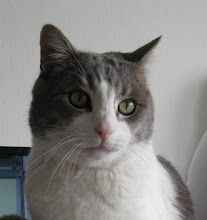A short day today: there are excursions in the afternoon, as well as several barbequeues (including the one I attended).
But before then we had to "work". The plenary was given by Michael Majerus. He talked about the classic peppered moth example of evolution. The original story is well known, but some of the original work by Kettlewell has been criticised, and a book appeared a few years go which accused Kettlewell of fraud. The book has been panned (and when I read it, I wasn't convinced either), but is used by creationists as the basis of one of their assaults on evolution. Actually, there are some good criticisms of Kettlewell's work, so Majerus decided to re-run the experiments (actually not quite - he would have needed a wood which is still polluted) but redesigning them to take the criticisms into account.
Majerus ran his studies for 6 years in his field site (actually his back garden), and also trapped moths near by to look at the change in the melanic form. The long and the short of it is that he replicated Kettlewell's results (qualitatively - after half a century we would expect some differences). So, it looks like Kettlewell was right after all (to the surprise of nobody in the room). We then had a sermon about how we need to keep faith and belief out of science, and that the peppered moth is such a good example for education that it should be used. Not really controversial for this audience, but good to rally the troops.
The parallel sessions weren't too interesting for me, but I went to Jim Mallet's talk on mimicry in Heliconius and other butterflies. This is a story that's been going on for years, and I look in on it when I'm at meetings. The latest thing is that they are thinking about how mimicry can affect speciation - mimicking a distasteful species means you don't get eaten, and different populations mimic different species in different areas. But wing colouration also affects mating behaviour (quite simply, the male can't recognise the female that's the 'wrong' mimic), so that could lead to reproductive separation and speciation. SO, they're now looking for hybrids between species, and also into the genetics and development of wing colour. More next time.....
In the afternoon I didn't go on an excursion, instead we had a barbaqueue in the house I'm staying (err, actually outside the house). Lots of beer drunk, a new wealth index invented, and just after a pregnant lady sat down next to her, Vilppu asking "So, how do you get the sperm?"
Friday, 24 August 2007
ESEB: Thursday
Posted by
Bob O'Hara
at
08:44
![]()
Labels: conference, ESEB, evolution
Subscribe to:
Post Comments (Atom)

No comments:
Post a Comment